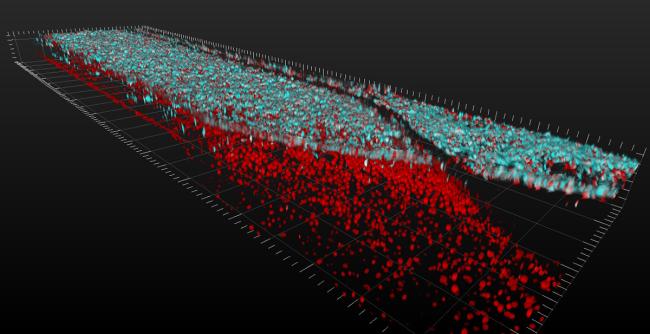ALS researchers begin recreating human spinal cords on a chip
Media Advisory Friday, April 27, 2018
ALS researchers begin recreating human spinal cords on a chip
NIH-funded study closes in on personalized drug testing for neurological disorders.

What
Aided by advanced stem cell technology and tissue chips, National Institutes of Health-funded researchers used stem cells originally derived from a person’s skin to recreate interactions between blood vessels and neurons that may occur early in the formation of the fetal human spinal cord. The results published in Stem Cell Reports suggest that the system can mimic critical parts of the human nervous system, raising the possibility that it may one day, be used to test personalized treatments of neurological disorders.
Led by Samuel Sances, Ph.D., and Clive N. Svendsen, Ph.D., Cedars-Sinai Board of Governors Regenerative Medicine Institute, Los Angeles, CA, the researchers first converted the stem cells into newborn spinal cord neurons or epithelial cells that line walls of brain blood vessels. In most experiments, each cell type was then injected into one of two chambers embedded side-by-side in thumb-sized, plastic tissue chips and allowed to grow. Six days after injections, the researchers found that the growing neurons exclusively filled their chambers while the growing blood vessel cells not only lined their chamber in a cobblestone pattern reminiscent of vessels in the body, but also snuck through the perforations in the chamber walls and contacted the neurons. This appeared to enhance maturation of both cell types, causing the neurons to fire more often and both cell types to be marked by some gene activity found in fetal spinal cord cells.
Tissue chips are relatively new tools for medical research and since 2012 the NIH has funded several tissue-chip projects. Unlike traditional petri dish systems, tissue chips help researchers grow cells in more life-like environments. Using microprocessor manufacturing techniques, the chambers can be built to recreate the three-dimensional shapes of critical organ parts and the tight spaces that mimic the way viscous, bodily fluids normally flow around the cells. Both factors can influence the normal growth of organs and results from this study supported this idea. The tissue chips allowed the researchers to grow neurons and blood vessels together, which was impossible to do in petri dishes. Moreover, neurons grown alone in tissue chips had firing patterns and gene activity that were more mature than cells grown in petri dishes. Although further genetic analysis suggested the tissue-chip cells were in an early stage of fetal spinal cord formation, the researchers concluded that, overall, this is a promising start for the development of chips that mimic a patient’s nervous system.
Who
Danilo Tagle, Ph.D., program director, NIH’s National Center for Advancing Translational Research
Margaret Sutherland, Ph.D., program director, NIH’s National Institute of Neurological Disorders and Stroke
Article
Sances et al. Human iPSC-Derived Endothelial Cells and Microengineered Organ-Chip Enhance Neuronal Development, April 10, 2018, Stem Cell Reports; DOI: 10.1016/j.stemcr.2018.02.012
This study was supported by the NIH (NS105703), the ALS Association (18-SI-389), the California Institute for Regenerative Medicine (DISC1-08800). Cedars-Sinai is a minority stock holder in Emulate, Inc., the company that made the study's organ-chip microfluidic devices, and an officer of Cedars-Sinai serves on Emulate's Board of Directors. Emulate provided no funding for the study.
About the National Center for Advancing Translational Sciences (NCATS): NCATS conducts and supports research on the science and operation of translation — the process by which interventions to improve health are developed and implemented — to allow more treatments to get to more patients more quickly. For more information about how NCATS is improving health through smarter science, visit https://ncats.nih.gov.
NINDS is the nation’s leading funder of research on the brain and nervous system. The mission of NINDS is to seek fundamental knowledge about the brain and nervous system and to use that knowledge to reduce the burden of neurological disease.
About the National Institutes of Health (NIH): NIH, the nation's medical research agency, includes 27 Institutes and Centers and is a component of the U.S. Department of Health and Human Services. NIH is the primary federal agency conducting and supporting basic, clinical, and translational medical research, and is investigating the causes, treatments, and cures for both common and rare diseases. For more information about NIH and its programs, visit www.nih.gov.
NIH…Turning Discovery Into Health®
Related Links
Tissue Chip for Drug Screening
Amyotrophic Lateral Sclerosis (ALS) Information Page
Frontotemporal Dementia Information Page


